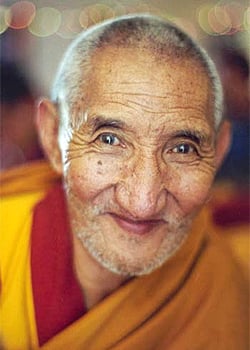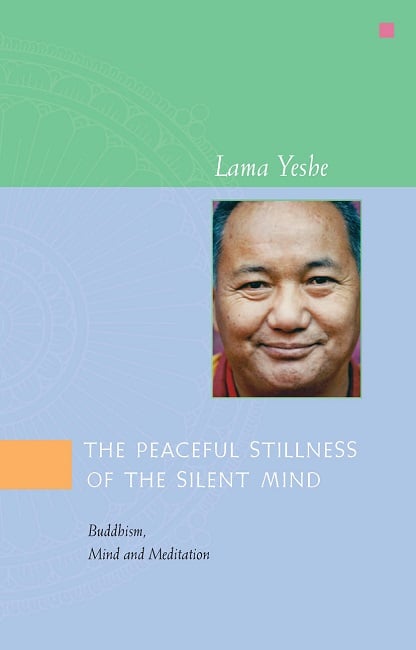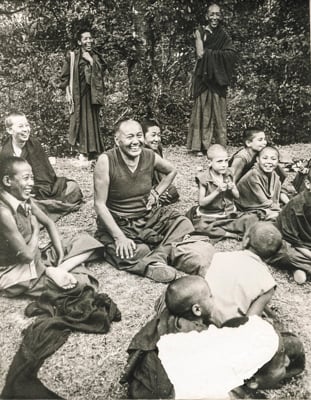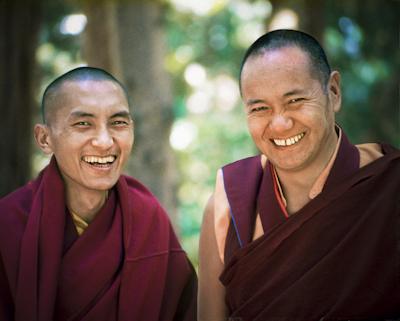Dear LYWA Friends,
Thank you so much for reading our monthly e-letter. Don’t forget to share it far and wide!
The Only Antidote
The world seems a pretty unruly place these days—ignorance, greed, aggression…must be samsara. As we observe or, for some of us, experience, the violence around us and the ignorance of most politicians in dealing with world problems, we’re reminded how all these things are manifestations of karma, which comes from delusion, which comes from the mind: ours and everybody else’s. And that the only antidote is one that attacks these symptoms at their root: the holy Dharma.
Therefore all of us here at the Lama Yeshe Wisdom Archive thank you for helping us spread the Dharma around the world for peace, happiness and the benefit of all. We get many letters telling us how much our free books are appreciated and I always think that the credit really goes to our kind benefactors, who supply the fuel that powers our activities. Thank you all so much.
Our Precious Teachers Another manifestation of our failing karma is the gradual disappearance of the great masters who came from Tibet. As you know, in January the great Ribur Rinpoche passed away. Richard Gere wrote about this great lama in Tricycle magazine and recently His Holiness the Dalai Lama gave advice on practices for his quick return.
Another manifestation of our failing karma is the gradual disappearance of the great masters who came from Tibet. As you know, in January the great Ribur Rinpoche passed away. Richard Gere wrote about this great lama in Tricycle magazine and recently His Holiness the Dalai Lama gave advice on practices for his quick return.
Now we have received news that another of our great lamas, Kirti Tsenshab Rinpoche, has inoperable cancer. Lama Zopa Rinpoche has recommended several practices we can do to strengthen our karma with this wonderful teacher (even if we have not met him) and you will link to news about him here. However, I found Kirti Tsenshab Rinpoche’s reaction to his diagnosis inspiring and would like to share it with you:
Soon after I was informed about the results of my CT scan, people asked me whether I wished to publicize my condition or not. I always thought that trying to hide ones age or state of health, is very strange. So I asked my translator to let people know what is going on.
I am fully aware of the fact that the disease, especially at this stage, is incurable. But I am not sad, or disappointed in any way. When Professor Oliven Arye informed me of the presence of a tumor in my liver, I thought immediately that he was so very, very kind. He was extremely kind to me. We all practice tonglen with the specific aim to prolong the life of HH the Dalai Lama. Of course I have recited certain verses from Lama Chöpa many times:
And thus compassionate gurus, we seek your blessings that all karmic debts, obstacles and suffering of mother beings, may without exception, ripen upon us right now and that we may give our happiness and virtue to others and thereby invest all beings in peace; as well as in order to rescue all beings from the vast seas of existence we seek your blessings to become adept in bodhicitta through a pure selfless wish, and by love and compassion conjoined with the visual technique of mounting, giving and taking upon your breath.
But it was more or less mere theory for me.
When I was told that I have cancer, I did not feel sad or upset. On the contrary my mind was uplifted, and it felt light and open. I thought: Finally, I have the chance to put this theory into practice now! My prayers have come true. How wonderful! I intend to use whatever time I have left in order to deepen my practice of tonglen. What would be the benefit of trying to conceal my situation? I think it is far better that people know that I have come to manifest this tumor and now I can really practice. I don’t want you to be sad. I want you to be happy and inspired since I now have such a wonderful opportunity to practice in a way that all bodhisattvas do. My doctor has been so kind to me. Why would I ever want to hide the fact that I am now practicing in the footsteps of the bodhisattvas?
Towards the end of the talk Rinpoche expressed his wish to record his experiences as the disease develops further. He believes that this material can be very useful to many other cancer patients, their families and hospices, everywhere in the world.
 Update on our Forthcoming Books
Update on our Forthcoming Books
Otherwise, life at the Archive goes on. Our three Lama Yeshe books are in the final stages of preparation. A reprint of The Peaceful Stillness of the Silent Mind and our latest new release Ego, Attachment and Liberation are with our designer and Universal Love: the Yoga Method of Buddha Maitreya is in final editing. We look forward to sending them to our members and benefactors soon. Of course, as usual, we couldn’t be publishing these books without you, and I want to express my heartfelt thanks to all who responded so magnificently to our appeals for funds to print these books and all who wanted to!
What's New on our Website
The number of teachings on our website continues to grow. We have just posted Lama Zopa's Rinpoche's translation of the Burning Offering to Dorje Khadro sadhana along with Rinpoche's commentary on this purification practice. Note that you can also purchase this as a booklet from the Kopan Monastery bookstore.
We have also expanded and updated the General Practice Advice section of Lama Zopa Rinpoche's online Advice Book. In this section Rinpoche is responding to queries regarding daily and life-long practices and at the same time gives—sometimes brief, sometimes extensive—advice on a variety of topics. We had so many of these kinds of advices we needed to create a second section titled More General Practice Advice.
Once again, thank you so much for your kind support, and please enjoy Lama Yeshe’s teaching below.
Much love,
Nick Ribush
Director
 Taking Suffering and Giving Happiness
Taking Suffering and Giving Happiness
We are most fortunate to have been able to pinpoint attachment as the greatest of all problems. When we speak of evil, demons and so forth, it’s the inner devil of attachment we’re talking about. Even though for countless lives we’ve looked outside ourselves for the source of our problems, there’s nothing external to blame. Therefore we should rejoice that we have finally identified this inner cause of all suffering.
We can be quite foolish. Say you’re in a spooky old house somewhere with a couple of friends. It’s late at night and you’re watching horror movies on TV. One of your friends says, “Don’t go into the basement; there’s something evil down there.” Then, if you do have to go down to the basement, you feel scared: “There really is something evil down here.” You’re so easily prone to superstition. This is completely silly. There’s no such thing as external evil and fear of it is simply a projection of the evil in your own mind. If you speculate enough your superstitious mind is sure to produce something and where once you were unafraid you now feel fear. All such foolishness comes from attachment.
Therefore finally recognizing that all these negative things—demons, enemies, evil or whatever other terms are used in everyday conversation, science or religion—come from the inner demon of attachment and bravely changing attachment to oneself into concern for others is both wonderful and wise.
There are countless living beings on Earth but very few know about exchanging self and others. This practice may be very difficult but it’s extremely worthwhile. If you can do it, it will help solve all your problems. Changing your outlook in this way transforms whatever misery you perceive into the peaceful path of liberation.
We desperately need a method such as this. Life is suffering; our minds are weak. Exchanging self and others is truly revolutionary and this inner revolution, which has nothing to do with radical external change, completely turns our mental attitude upside down.
If you were to think that Buddhism was simply about sitting in meditation practicing concentration, you might reject it: “My knees hurt; my body wasn’t built for this. Buddhism is just a Himalayan lama thing. Anyway, I can’t live without working and taking care of my worldly affairs. Dharma is not for me.” But Mahayana Buddhism is about much more than just sitting in concentration. If you are wise, you can practice twenty-four hours a day.
Whenever any difficulty or problem arises, instead of getting depressed, be brave. Think, “Fantastic. If this problem had not arisen I might have felt I had no problems. This problem is my teacher; all problems are my teacher. They give me knowledge-wisdom and help me recognize more clearly the nature of attachment. This is so wonderful. May all mother sentient beings’ problems ripen upon me right now and may they receive all my merit, fortune and wisdom.”
If you have difficulty taking the suffering of others onto yourself, first practice on yourself. The next time your knees hurt when you’re sitting in meditation, take that pain onto your ego and let it freak out. Let your ego freak out more and more. Practice that for a week.
Then practice taking onto yourself all the suffering you have ever experienced in your life. Your ego and attachment won’t like that either, but let them freak out again. Then slowly, slowly extend your practice to take upon yourself the sufferings of your parents, your friends, all the people in your country and all the people on Earth until you are receiving the problems and suffering of all sentient beings throughout the universe. Then, without hesitation, send out to them all your possessions, happiness and merit.
What is the technique for actually practicing this taking and giving meditation, which Tibetans call tonglen? You combine it with meditation on the breath in what is basically a nine-round breathing meditation.
Start by breathing out through your right nostril. Visualize the air you exhale in the form of white light, the essence of which is all your positive energy and wisdom. This white light radiates to all sentient beings in the six realms of samsara and beyond. It enters their left nostril, goes into their hearts and generates in them great bliss. Visualize the air they exhale in the form of thick black smoke, the essence of which is all their negativity, confusion and heavy suffering. This dark, polluted energy enters your left nostril and goes down into your heart. Don’t leave it outside of you; bring it right down into your heart so that your ego and attachment completely freak out.
The nature of attachment is such that when problems arise, it blindly pushes them away. This practice trains your mind to handle negativity, feel compassion for the others and take their suffering and problems onto yourself, which in turn helps you overcome self-cherishing and cherish others more than yourself.
Do the above cycle of breathing white light out through your right nostril and black smoke in through your left three times. Then breathe out through your left nostril and in through your right three times. Then breathe out and in through both nostrils together three times. At the end of each nine rounds concentrate for as long as you can that you and all other sentient beings have been completely purified of all suffering, negativity and dualistic mind and are fully enlightened, experiencing everlasting bliss that pervades your entire body and mind. When you lose focus on this, repeat the nine rounds once more. Repeat this cycle again and again for the duration of the session.
Don’t think that this is just a fantasy and that doing this meditation makes no difference to the suffering of yourself and others. Actually, it is a profound practice and each time you do it, it brings you and all other sentient beings closer to enlightenment. The greatest obstacle to enlightenment is self-cherishing, and taking on all the suffering, karma and delusions of all sentient beings and giving them all your happiness and merit is best way of overcoming it. The most effective way of training your mind to overcome self-cherishing is to practice tonglen meditation.
Edited from the Lama Yeshe Wisdom Archive by Nicholas Ribush. To be published in Ego, Attachment and Liberation, forthcoming from the Archive in 2006.
[For more teachings on tonglen and transforming our problems see Lama Zopa Rinpoche's Advice Book.]































